Ein Meisterkurs in englischer Grammatik für Fortgeschrittene: Die Conditionals
Ein Meisterkurs in englischer Grammatik für Fortgeschrittene: Die Conditionals
┃Read in less than 6 minutes
Conditional sentences usually have two clauses: the if clause and the main (or result) clause. The result clause is dependent on the if clause.
For example:
If you take the time to read this blog, (then) you’ll improve your performance in the Advanced exam!
So, you taking the time to read the blog is the conditional action (‘if’), and you improving your performance will (hopefully!) be the result.
We usually form conditional sentences in one of two ways:
if clause main clause
If I had more time, I’d brush up on English idioms.
main clause if clause
I’d brush up on English idioms if I had more time.
Warm-up task:
Have a look at the conditional sentences and try to complete the gaps using the right forms. (Answers at the end of the post.)
1. If you _______ (not help) me, I _______ (not pass) the Advanced exam!
2. Why didn’t you send me a message? If I _______ (know) you were coming, I _______ (fetch) you from the train station.
3. I _______ (sleep) in when I _______ (go) to bed late.
4. If I _______ (have) my credit card on me, I _______ (pay) for the meal. Unfortunately, I left it at home.
Above there are examples of the 0, 1, 2 and 3 conditionals. Do you know which is which?
1- first conditional (i.e. the likely / possible condition)
2- third conditional (i.e. the past/impossible condition)
3- zero conditional (i.e. the general condition)
4- second conditional (i.e the unlikely / improbable condition)
Now, our choice of tense depends on two things:
- The time of the condition (if it’s in the past, present or future)
- The likelihood of the event (if it’s possible or impossible)
Let’s take a closer look at each conditional structure to see what I mean by that.
Solutions
Solutions:
- If you don’t help me, I won’t pass the Advanced exam!
- Why didn’t you send me a message? If I had known you were coming, I would have fetched you from the train station.
- I sleep in when I go to bed late.
- If I had my credit card on me, I would pay for the meal. Unfortunately, I left it at home.
A zero conditional describes a general situation that’s, well, generally true. It’s also used for describing facts.
We use the present tense after ‘if’ and then present simple to show the result:
If/when a baby is hungry, it cries.
It’s a certainty (= 100% sure) that this will happen so the situation (a hungry baby) and the result (crying) are guaranteed.
We can use other present tenses in both clauses:
If my dog is looking depressed, I take him for a walk. (= present continuous)
It’s dangerous to eat chicken it if hasn’t been cooked properly! (= present perfect)
‘If’ can mean ‘when’ [= ‘whenever’]:
If/when/whenever it rains, we play boardgames inside.
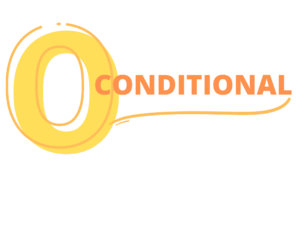
A first conditional describes a real, possible situation.
We use the present tense after ‘if’ and then ‘will/won’t’ to show the result:
If I finish work early on Friday, we’ll go to the beach.
There is a good possibility that this will happen so the situation (finishing work early) and the result (going to the beach) are realistic.
‘Going to’ can be used instead of ‘will’:
If you don’t hurry up, you’re going to miss the bus!
The modal verb ‘can’ is also very common here:
I can only buy a new headset if I have enough money.
We can use other present tenses with the ‘if’ clause:
If you’re travelling in the high season , you’ll need to book your accommodation in advance. (= present continuous)
If you’ve got your passport, you’ll be able to travel abroad. (= present perfect)
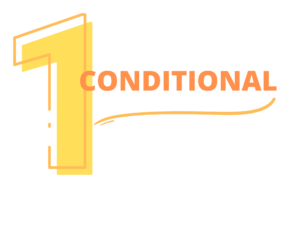
A second conditional describes an unreal, imaginary situation in the present or future.
We use the past tense after ‘if’ and then ‘would/wouldn’t’ to show the result:
If I won the lottery, I’d buy a one-way ticket to the Maldives.
There is a small possibility that this will happen so the situation (winning the lottery) and the result (going to the Maldives) are imagined.
The modal verbs ‘could’ and ‘might’ are also common here:
If she had a better chair, she might have less backache.
If he got the US visa, he could go over there for the conference.
We can also use the past continuous/ ‘was going to’ with the ‘if’ clause:
If the band were coming to town, I’d definitely go to their concert.
NOTE: ‘Were’ is often used instead of ‘was’ in formal language. It’s the correct grammatical form, but it’s not always used in spoken English (so don’t stress too much about it!)
If I were rich, I’d always travel first-class! (= but I’m not, so I’m stuck in economy)
And it’s a common way of giving advice in English:
That cough sounds pretty bad. If I were you, I’d call a doctor.
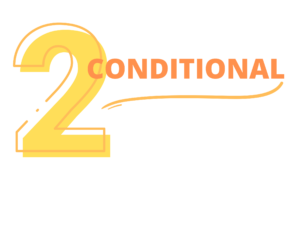
A third conditional describes an unreal, imaginary situation in the past.
We use the past perfect tense after ‘if’ and then ‘would/wouldn’t + have + past participle’ to show the result:
If he’d (= had) been more careful, he wouldn’t have fallen off the ladder.
This means that he wasn’t careful, so he did fall and hurt himself. This is a past situation that is different from the one that really happened. It’s totally imagined.
We can use past perfect continuous form:
If he hadn’t been wearing a helmet, he would’ve been badly injured.
So, let’s test your grammar skills (and musical knowledge)
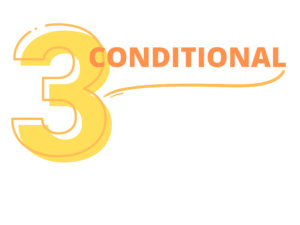
CONDITIONALS IN SONGS
Match the if clause and main clause in these lyrics. Do you recognise any of these songs?
The last one is a bit different, isn’t it? The if clause is in the 3rd conditional and the main clause in 2nd. Hmm, what’s that about? Well, watch the video to find out about these ‘mixed conditionals’ … and more!
Now, it’s over to you!
Can you think of any conditional structures in the lyrics of your favourite songs? If so, write them in the comment section below. And, if you’re feeling especially brave, tell us which conditional it is. We’d love to hear from you 🙂
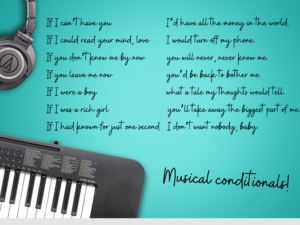
Solutions
Solutions:
- If I can’t have you, I don’t want nobody, baby.
- If I could read your mind, love, what a tale my thoughts would tell.
- If you don’t know me by now, you will never, never know me.
- If you leave me now, you’ll take away the biggest part of me
- If I were a boy, I would turn off my phone
- If I was a rich girl, I’d have all the money in the world.
- If I had known for just one second you’d be back to bother me.






0 commentaires